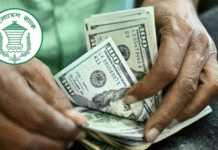Economists say Bangladesh reaching danger level of income inequality
They stress fair distribution of resources
FE Report | September 08, 2019
 Former Bangladesh Bank governor Dr Mohammed Farashuddin speaking as the chief guest at a national seminar on Income and Wealth Inequality organised by Bangladesh Economic Association (BEA) in the city on Saturday — FE photo
Former Bangladesh Bank governor Dr Mohammed Farashuddin speaking as the chief guest at a national seminar on Income and Wealth Inequality organised by Bangladesh Economic Association (BEA) in the city on Saturday — FE photoEconomists made on Saturday an urgent call for measuring growth with equity as Bangladesh is reaching the danger level of income inequality.
Alongside a uniform and quality education system at all levels, they suggested allowing a truly impartial institutional and regulatory framework for fair distribution of resources.
These policy concerns and suggestions came at a national seminar on ‘Income and resources disparity in Bangladesh’ hosted by the Bangladesh Economic Association (BEA) in the capital.
Former Bangladesh Bank (BB) governor Dr Mohammed Farashuddin was present as chief guest at the event moderated by BEA president Dr Abul Barkat.
Presenting a keynote paper on the topic, noted economist Prof Dr Moinul Islam said Gini coefficient is one of the key measures that is used globally in calculating income inequality.
The country that crosses 0.5 in the Gini index is being categorised in the state of dangerous income inequality, he added.
Mr Islam, also a former chairman of economics department at Chattogram University, said the range of coefficient in Bangladesh was 0.36 in 1974.
“But the range has kept increasing over the years and reached 0.483 in 2016. So, we’re very close to the mark of becoming a dangerous inequality state.”
Citing the World Ultra Wealth Report-2018, Mr Islam said Bangladesh ranked as the fastest-growing country globally in terms of its increasing rich population from 2012 to 2017.
.jpg)
According to the report, 255 people in Bangladesh have the minimum wealth of $30 million (Tk 2.52 billion).
“I think the number will be several thousands,” the economist mentioned.
About increased bad loans, he said vested industrialists have been swindling billions out of the banking system.
“It (bad debt) is also contributing to take inequality to a danger level. The government’s zero-tolerance policy against corruption is not reflected in reality.”
Bangladesh Institute of Development Studies (BIDS) director general Dr KAS Murshid put emphasis on the fair, impartial and rule-based functioning of the institutions and regulatory bodies.
“It’s not possible without a political commitment,” he argued.
Mr Murshid said Bangladesh made good progress on many socio-economic fronts through its capitalistic mode of production.
“But we’re passing through a critical time now as we’re not getting desired outcomes from growth. So, we have to think afresh to make this growth inclusive and fruitful.”
Dr Md Shafiq Uz Zaman, chairman of economics department at Dhaka University, said inequality cannot be reduced through development plans ignoring rural areas.
“We have to lay emphasis on agro-based industrialisation to this effect,” he said.
In his speech, Dr Farashuddin said, “If there is an equal opportunity for all, disparity at this level would not occur,” he said.
Basically, the country’s financial sector is facing a crisis of trust from the people and a long-term reform is needed to restore their confidence, he said.
“Corruption, nepotism and influence of the middleman must stop completely. I want equitable growth, increased tax-GDP ratio, tax-revenue ratio and proper functioning of the regulatory bodies,” he stated.
The economist spotlighted factors like stopping commercialisation of education, health, introduction of uniform education system and land reforms.
Former finance minister M Syeduzzaman and BEA general secretary Jamal Uddin Ahmed, among others, also spoke at the function.
jubairfe1980@gmail.com









